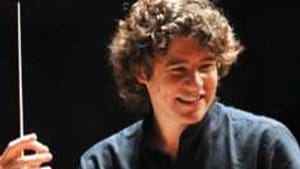Stay in the Loop
BSR publishes on a weekly schedule, with an email newsletter every Wednesday and Thursday morning. There’s no paywall, and subscribing is always free.
Sibelius meets Generation Z
Ticciati conducts Beethoven and Sibelius (1st review)

Robin Ticciati, making his conducting debut with the Philadelphia Orchestra at age 28, looks even more youthful than his age. He's tall, slender, curly-haired and adorable. What's more, he's willing to take risks and present standard compositions in new interpretations. But something was missing this weekend.
Ticciati's soloist in the Beethoven Violin Concerto was Arabella Steinbacher, the 24-year-old daughter of a German father and Japanese mother. She plays with beautiful tone, smooth and silky, and graceful legato. Together, the two of them favored slow tempi and some romantic suspensions of time. In the concerto's final cadenza (written by Fritz Kreisler), she revealed that she can dig in with power, to dazzling effect.
On the whole, though, her interpretation was dreamy and atmospheric. It sounded more like Lalo than Beethoven.
Therein lies the problem. Conductor and violinist missed the rebellious energy that we associate with Beethoven. I discerned little of the dissident defiance that's inherent in this work.
Triumph over.... what?
I'm happy to report that Ticciati is not one-dimensional, nor does he make a habit of slow tempi. Although the Beethoven lasted two minutes longer than expected, his Sibelius Second Symphony finished two minutes ahead of its norm.
For this piece, Ticciati presented the episodic sections clearly and brightly, without the darkness that most listeners associate with Sibelius. The march-like final movement unfolded with inexorable pulse and radiated a happy feeling.
It's refreshing to see a conductor going against tradition. But did his renderings make the pieces sound better? Not this time. The end of the Sibelius should speak of triumph over great difficulties, but here the adversities weren't sufficiently displayed.
They knew Sibelius
Eugene Ormandy, who led the Orchestra from 1936 to 1980, knew Sibelius personally and brought out his brooding quality. Leopold Stokowski (1912-36) traveled with Sibelius in Scandinavia three decades before Ormandy. When I discussed Sibelius with Stokowski in 1968, he remarked that the great Finnish composer embodied the spirit of his land: dark, bleak, lonely, open-spaced.
Even if you dispute that characterization, you still must agree that Sibelius was a young composer from an unrecognized corner of the cultural universe who was saying, in effect, "Look, world, I'm different. This is my voice."
Such a composer shouldn't be played conventionally. A mysterious and dark tone should suffuse the piece. It's not wise to strip away what's unique about a composer.♦
To read another review by Robert Zaller, click here.
Ticciati's soloist in the Beethoven Violin Concerto was Arabella Steinbacher, the 24-year-old daughter of a German father and Japanese mother. She plays with beautiful tone, smooth and silky, and graceful legato. Together, the two of them favored slow tempi and some romantic suspensions of time. In the concerto's final cadenza (written by Fritz Kreisler), she revealed that she can dig in with power, to dazzling effect.
On the whole, though, her interpretation was dreamy and atmospheric. It sounded more like Lalo than Beethoven.
Therein lies the problem. Conductor and violinist missed the rebellious energy that we associate with Beethoven. I discerned little of the dissident defiance that's inherent in this work.
Triumph over.... what?
I'm happy to report that Ticciati is not one-dimensional, nor does he make a habit of slow tempi. Although the Beethoven lasted two minutes longer than expected, his Sibelius Second Symphony finished two minutes ahead of its norm.
For this piece, Ticciati presented the episodic sections clearly and brightly, without the darkness that most listeners associate with Sibelius. The march-like final movement unfolded with inexorable pulse and radiated a happy feeling.
It's refreshing to see a conductor going against tradition. But did his renderings make the pieces sound better? Not this time. The end of the Sibelius should speak of triumph over great difficulties, but here the adversities weren't sufficiently displayed.
They knew Sibelius
Eugene Ormandy, who led the Orchestra from 1936 to 1980, knew Sibelius personally and brought out his brooding quality. Leopold Stokowski (1912-36) traveled with Sibelius in Scandinavia three decades before Ormandy. When I discussed Sibelius with Stokowski in 1968, he remarked that the great Finnish composer embodied the spirit of his land: dark, bleak, lonely, open-spaced.
Even if you dispute that characterization, you still must agree that Sibelius was a young composer from an unrecognized corner of the cultural universe who was saying, in effect, "Look, world, I'm different. This is my voice."
Such a composer shouldn't be played conventionally. A mysterious and dark tone should suffuse the piece. It's not wise to strip away what's unique about a composer.♦
To read another review by Robert Zaller, click here.
What, When, Where
Philadelphia Orchestra: Beethoven, Violin Concerto; Sibelius, Symphony No. 2. Arabella Steinbacher, violin; Robin Ticciati, conductor. January 12-14, 2012 at Verizon Hall, Kimmel Center, Broad and Spruce Sts. (215) 893-1999 or www.philorch.org.
Sign up for our newsletter
All of the week's new articles, all in one place. Sign up for the free weekly BSR newsletters, and don't miss a conversation.
 Steve Cohen
Steve Cohen